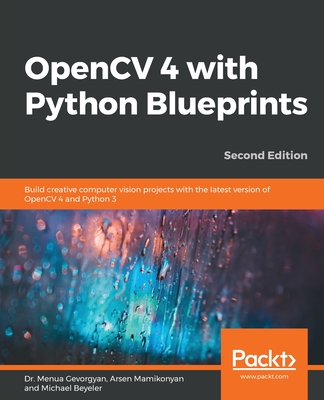Machine Learning for OpenCV 4 : Intelligent algorithms for building image processing apps using OpenCV 4, Python, and scikit-learn, 2/e (Paperback)
暫譯: OpenCV 4 機器學習:使用 OpenCV 4、Python 和 scikit-learn 建立影像處理應用的智慧演算法,第二版 (平裝本)
Aditya Sharma , Vishwesh Ravi Shrimali , Michael Beyeler
- 出版商: Packt Publishing
- 出版日期: 2019-09-06
- 售價: $1,715
- 貴賓價: 9.5 折 $1,629
- 語言: 英文
- 頁數: 420
- 裝訂: Paperback
- ISBN: 1789536308
- ISBN-13: 9781789536300
-
相關分類:
Machine Learning
立即出貨 (庫存=1)
買這商品的人也買了...
-
 $402深入淺出強化學習 : 原理入門
$402深入淺出強化學習 : 原理入門 -
 $474深入理解 TensorFlow 架構設計與實現原理
$474深入理解 TensorFlow 架構設計與實現原理 -
 $299深入淺出 SSD:固態存儲核心技術、原理與實戰
$299深入淺出 SSD:固態存儲核心技術、原理與實戰 -
 $414機器學習經典算法剖析 基於OpenCV
$414機器學習經典算法剖析 基於OpenCV -
 VR Developer Gems
VR Developer Gems$3,980$3,781 -
 Mastering OpenCV 4 with Python (Paperback)
Mastering OpenCV 4 with Python (Paperback)$1,760$1,672 -
 不會 C 也是資安高手:用 Python 和駭客大戰三百回合
不會 C 也是資安高手:用 Python 和駭客大戰三百回合$620$490 -
 The CUDA Handbook: A Comprehensive Guide to Gpu Programming
The CUDA Handbook: A Comprehensive Guide to Gpu Programming$2,280$2,166 -
 $402OpenCV 4 電腦視覺項目實戰, 2/e
$402OpenCV 4 電腦視覺項目實戰, 2/e -
 $796強化學習, 2/e (Reinforcement Learning: An Introduction, 2/e)
$796強化學習, 2/e (Reinforcement Learning: An Introduction, 2/e) -
 CV + AI 自己動手完成圖像搜尋引擎
CV + AI 自己動手完成圖像搜尋引擎$600$474 -
 OpenCV 4 專案實務, 2/e (Learn OpenCV 4 by Building Projects: Build real-world computer vision and image processing applications with OpenCV and C++, 2/e)
OpenCV 4 專案實務, 2/e (Learn OpenCV 4 by Building Projects: Build real-world computer vision and image processing applications with OpenCV and C++, 2/e)$450$382 -
 科班出身的 AI人必修課:OpenCV 影像處理 使用 Python
科班出身的 AI人必修課:OpenCV 影像處理 使用 Python$780$616 -
 超限未來:無人駕駛先端技術核新領航 (舊名: 無人駕駛真的來了:第一本從技術面深入的實作書)
超限未來:無人駕駛先端技術核新領航 (舊名: 無人駕駛真的來了:第一本從技術面深入的實作書)$490$417 -
 $1,464Deep Learning with TensorFlow 2 and Keras, 2/e (Paperback)
$1,464Deep Learning with TensorFlow 2 and Keras, 2/e (Paperback) -
 AIOT 與 OpenCV 實戰應用:Python、樹莓派、物聯網與機器視覺
AIOT 與 OpenCV 實戰應用:Python、樹莓派、物聯網與機器視覺$480$408 -
 $1,674Learning OpenCV 4 Computer Vision with Python 3, 3/e (Paperback)
$1,674Learning OpenCV 4 Computer Vision with Python 3, 3/e (Paperback) -
 OpenCV 4 with Python Blueprints, Second Edition
OpenCV 4 with Python Blueprints, Second Edition$1,950$1,852 -
 $708遷移學習 -- TRANSFER LEARNING (楊強教授新作)
$708遷移學習 -- TRANSFER LEARNING (楊強教授新作) -
 仿人機器人建模與控制
仿人機器人建模與控制$474$450 -
 $464計算機視覺中的深度學習
$464計算機視覺中的深度學習 -
 $407OpenCV 圖像處理入門與實踐
$407OpenCV 圖像處理入門與實踐 -
 動手打造深度學習框架
動手打造深度學習框架$539$512 -
 不只是 CUDA,通用 GPU 程式模型及架構原理
不只是 CUDA,通用 GPU 程式模型及架構原理$780$663 -
 $453大模型動力引擎 — PyTorch 性能與顯存優化手冊
$453大模型動力引擎 — PyTorch 性能與顯存優化手冊
相關主題
商品描述
Key Features
- Gain insights into machine learning algorithms, and implement them using OpenCV 4 and scikit-learn
- Get up to speed with Intel OpenVINO and its integration with OpenCV 4
- Implement high-performance machine learning models with helpful tips and best practices
Book Description
OpenCV is an opensource library for building computer vision apps. The latest release, OpenCV 4, offers a plethora of features and platform improvements that are covered comprehensively in this up-to-date second edition.
You'll start by understanding the new features and setting up OpenCV 4 to build your computer vision applications. You will explore the fundamentals of machine learning and even learn to design different algorithms that can be used for image processing. Gradually, the book will take you through supervised and unsupervised machine learning. You will gain hands-on experience using scikit-learn in Python for a variety of machine learning applications. Later chapters will focus on different machine learning algorithms, such as a decision tree, support vector machines (SVM), and Bayesian learning, and how they can be used for object detection computer vision operations. You will then delve into deep learning and ensemble learning, and discover their real-world applications, such as handwritten digit classification and gesture recognition. Finally, you'll get to grips with the latest Intel OpenVINO for building an image processing system.
By the end of this book, you will have developed the skills you need to use machine learning for building intelligent computer vision applications with OpenCV 4.
What you will learn
- Understand the core machine learning concepts for image processing
- Explore the theory behind machine learning and deep learning algorithm design
- Discover effective techniques to train your deep learning models
- Evaluate machine learning models to improve the performance of your models
- Integrate algorithms such as support vector machines and Bayes classifier in your computer vision applications
- Use OpenVINO with OpenCV 4 to speed up model inference
Who this book is for
This book is for Computer Vision professionals, machine learning developers, or anyone who wants to learn machine learning algorithms and implement them using OpenCV 4. If you want to build real-world Computer Vision and image processing applications powered by machine learning, then this book is for you. Working knowledge of Python programming is required to get the most out of this book.
Table of Contents
商品描述(中文翻譯)
**主要特點**
- 獲得有關機器學習演算法的見解,並使用 OpenCV 4 和 scikit-learn 實現它們
- 熟悉 Intel OpenVINO 及其與 OpenCV 4 的整合
- 實現高效能的機器學習模型,並提供有用的提示和最佳實踐
**書籍描述**
OpenCV 是一個開源庫,用於構建計算機視覺應用程式。最新版本 OpenCV 4 提供了大量功能和平台改進,這些內容在本書的最新第二版中得到了全面的介紹。
您將首先了解新功能並設置 OpenCV 4 以構建計算機視覺應用程式。您將探索機器學習的基本原理,甚至學習設計可用於圖像處理的不同演算法。隨著書籍的進展,您將學習監督式和非監督式機器學習。您將獲得使用 Python 中的 scikit-learn 進行各種機器學習應用的實踐經驗。後面的章節將專注於不同的機器學習演算法,例如決策樹、支持向量機(SVM)和貝葉斯學習,以及它們如何用於物體檢測的計算機視覺操作。然後,您將深入了解深度學習和集成學習,並發現它們的實際應用,例如手寫數字分類和手勢識別。最後,您將掌握最新的 Intel OpenVINO,以構建圖像處理系統。
到本書結束時,您將具備使用機器學習構建智能計算機視覺應用程式所需的技能,並能夠使用 OpenCV 4。
**您將學到的內容**
- 理解圖像處理的核心機器學習概念
- 探索機器學習和深度學習演算法設計背後的理論
- 發現訓練深度學習模型的有效技術
- 評估機器學習模型以提高模型的性能
- 在計算機視覺應用中整合支持向量機和貝葉斯分類器等演算法
- 使用 OpenVINO 與 OpenCV 4 加速模型推理
**本書適合誰**
本書適合計算機視覺專業人士、機器學習開發者或任何想學習機器學習演算法並使用 OpenCV 4 實現它們的人。如果您想構建由機器學習驅動的實際計算機視覺和圖像處理應用,那麼本書適合您。需要具備 Python 編程的工作知識,以便充分利用本書的內容。
**目錄**
目錄大綱
- A Taste of Machine Learning
- Working with Data in OpenCV
- First Steps in Supervised Learning
- Representing Data and Engineering Features
- Using Decision Trees to Make a Medical Diagnosis
- Detecting Pedestrians with Support Vector Machines
- Implementing a Spam Filter with Bayesian Learning
- Discovering Hidden Structures with Unsupervised Learning
- Using Deep Learning to Classify Handwritten Digits
- Ensemble Methods for Classification
- Selecting the Right Model with Hyperparameter Tuning
- Using OpenVINO with OpenCV
- Conclusion
目錄大綱(中文翻譯)
- A Taste of Machine Learning
- Working with Data in OpenCV
- First Steps in Supervised Learning
- Representing Data and Engineering Features
- Using Decision Trees to Make a Medical Diagnosis
- Detecting Pedestrians with Support Vector Machines
- Implementing a Spam Filter with Bayesian Learning
- Discovering Hidden Structures with Unsupervised Learning
- Using Deep Learning to Classify Handwritten Digits
- Ensemble Methods for Classification
- Selecting the Right Model with Hyperparameter Tuning
- Using OpenVINO with OpenCV
- Conclusion











